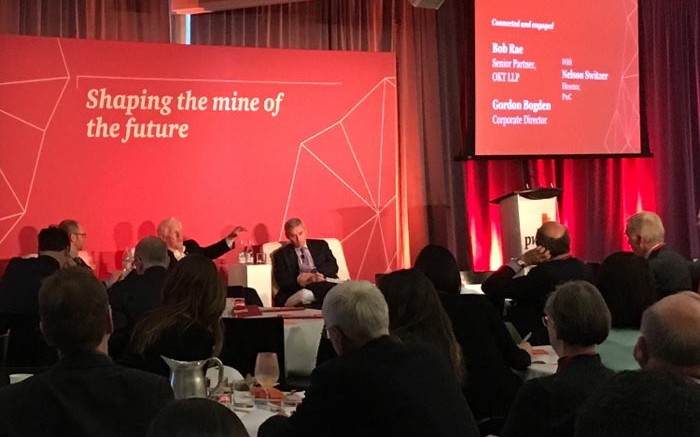About US$20-billion worth of projects globally in the industry today are stalled due to poor government or community relations, Gordon Bogden, a geoscientist and director on the boards of several mining companies, told a conference in Toronto hosted by PwC in partnership with The Northern Miner.
“Mining is the number-one industry to take people out of poverty around the globe, so it’s critical to global development, not just in Canada,” Bogden said. “But it’s been stalled. Why? Because of issues often with respect to community engagement, and this lack of partnership. So how do we move that forward?”
Failing to engage with communities can be a huge obstacle to economic growth, he added, given that mining and its related businesses are some of the biggest contributors to gross domestic product (GDP). In Canada, mining makes up 12% of GDP, while globally the figure is closer to 20%, he estimated.
The senior executive spoke at PwC’s “Shaping the mine of the future” event, along with Bob Rae, a senior partner at Olthuis Kleer Townshend LLP, which works with First Nations in Canada as legal counsel, advisor, negotiator and arbitrator.
“For a long time the assumption in law and the assumption in practice was that if you dealt with the government — national, state, local — you’d done your bit, and whatever arrangements you could work out with those governments was going to be sufficient for you to simply carry out your business,” Rae said. “But the reality today is different. The reality today, for a whole variety of reasons around the world, is that indigenous people are saying: ‘No, you haven’t completed the consultation if you’ve only consulted with those governments.’”
It’s also incorrect to suggest that indigenous communities are naturally opposed to development, Rae added. “I think that’s a myth, and I think you really miss the boat if you work on that assumption.”
The former premier of Ontario (1990–95), and interim federal leader and foreign affairs critic for the Liberal Party of Canada (2011–13), emphasized that mining companies and others in the extractive resources sector must first learn how to engage properly with indigenous communities if they want their projects to succeed.
“Increasingly people are recognizing that there has to be a new form of engagement and a new form of partnership, and that’s the era in which we are now living,” Rae said, who works with a number of First Nations groups in Ontario and in Western Canada.
“If people have no stake in anything and are feeling that there’s no way to benefit, they will simply oppose a development, and say, ‘Well, that’s not going to work for us, here’s a list of all the problems.’ But if people see what the benefits will be, what the actual return can be,” he says, the attitudes can change.
To support his point, Rae recalled a meeting he attended in a small, remote community in the Ring of Fire area of northern Ontario. When the talks turned to building a road, a young man of about twenty stood up at the back of the room and asked whether he would get a job building the road.
When Rae said yes, that part of the deal would be that members of the First Nations community would get hired in the construction process, the youth turned to the chief and said: “Don’t screw it up.”
Rae says: “That’s a bit of a change in terms of the mindset,” adding that it also showed a generational change that has taken place among groups of indigenous people, the world’s youngest demographic. “That’s why I keep saying: ‘Think about how that transformation is taking place.’ It doesn’t mean that people won’t have questions about the development, it doesn’t mean that getting to ‘yes’ on the development is easy, it’s not easy. But it does mean that, don’t assume it’s going to be a negative result. It isn’t, if engagement becomes the order of the day.”
Rae pointed to work he had done in the natural gas industry in B.C. as another example of where engagement happened “big time” under consultations and discussions, and the benefits that have been shared.
And he noted that both the new governments in Alberta and in Ottawa have stated publicly that the UN Declaration on the Rights of Indigenous People will be the basis of their public policy.
“That is a change, and you know, I suspect other governments will have to follow suit,” he said. “There will be a bunch of serious discussions about what that is going to mean, and we can talk about that. But I want to stress the last point, and just say it one more time: This is not about stopping development. This is about increasing engagement and ensuring that when development takes place, it will include the people that actually live on these lands.”
In terms of the best way to negotiate and engage with local communities, Rae said he had learned a few things over the years, and that above all, “face-to-face really matters.”
“The telephone doesn’t work, email doesn’t work, faxes don’t work, turning up, flying in, staying overnight, or for a few days, and going fishing, and talking to people, and engaging with people, works,” he said. “I would say to every mining CEO, if you’re not prepared to spend as much personal time as you would with talking to your investors, going to New York and going to the U.K. and getting your money — you’re missing the point.”
Rae added that he’s told politicians and everyone else that they have to learn how to do it. “It’s a new form of human engagement that you have to learn. You have to take your tie off, you have to just go in there and get with the program.”
“This is a face-to-face business now,” he adds. “It’s an on-the-ground business … and it’s a new group of people who will not be satisfied with seeing the No. 4 young guy come out and say: ‘I’m here representing the company.’ They’ll say: ‘Where’s your boss? I’m the chief, where’s your chief?’”
Both Rae and Bogden added that attitudes towards dealing with indigenous people at mining companies are changing, but still vary widely.
“Some companies, of course, are a little more progressive than others, and others are still, unfortunately, stuck in the 70s in the way they look at things, and at this kind of engagement, and they’re negotiating off a term sheet first,” Bogden says. “That doesn’t work here. You’ve got to break that.”
Rae and Bogden also emphasized that starting off on the right foot was important for the junior and intermediate companies that are often the first on the ground in many indigenous communities.
Bogden estimated that while there are 30 major mining companies around the globe, there are 1,400 junior and intermediate companies, which can be a force for change.






Be the first to comment on "Bob Rae on engagement: ‘Face-to-face really matters’"